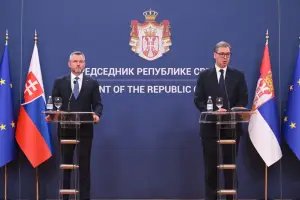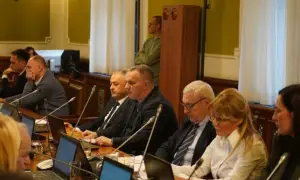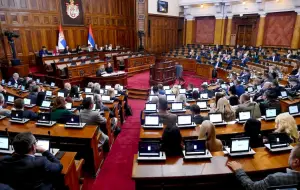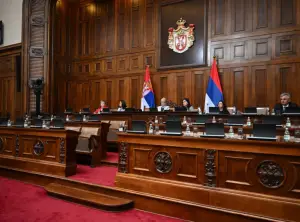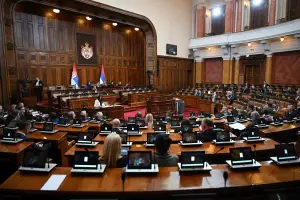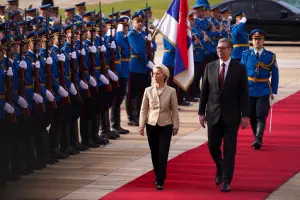Q:
A:
Laws important for Serbia-Montenegro EU integration and WTO accession adopted
Belgrade. Oct 22,
22 October 2005
The parliament of Serbia-Montenegro adopted today four laws important for Serbia-Montenegro’s EU integration and accession to the World Trade Organisation.
Bills presented by the Council of Ministers of Serbia-Montenegro on the laws on standardisation, accreditation, metrology and technical demands concerning products and quality control to determine that products are in accordance with regulations have been promptly adopted.
Under the new laws on standardisation, national standards henceforth are to be called Serbia-Montenegrin standards and they have been adopted with agreement of both sides involved so that the interest of individuals does not take priority over national interest. In the future, Serbia-Montenegrin standards and connected documents will be marked with the acronym ‘SCS’, instead of the ‘JUS’ marking they bear now.
New laws on accreditation will help create necessary conditions for equality in trade, so that any domestic product, including services, will be available in the foreign market without undergoing new measures of testing, control, and certification.
The law on metrology is completely new and it concerns the management of this sector according to conditions of market economy, and is in line with international regulations and practices in the European Union.
The provisions of this law concern the measures taken in the area of protecting the interest of individuals and legal persons, health and safety of people, animals and ecological environment, and the fulfilment of conditions required for free international trade.
Under the law on technical demands concerning products and determining if the product is in accordance with regulations, the Council of Ministers is to bring technical regulations in line with obligations to bilateral and multilateral agreements on the prevention and elimination of obstacles in international trade.
The adoption of these four laws is important because of the report on the progress Serbia-Montenegro has made in the implementation of administrative reforms, which the European Commission intends to publish on November 9, as well as bearing significance towards the beginning of talks on the Stabilisation and Association Agreement (SAA).
The parliament of Serbia-Montenegro adopted amendments to the Laws on the military, according to which the duration of obligatory army service will be six months. It also adopted amendments to the Laws on military schools and military scientific research institutes, according to which commanding officer training has been reduced from two years to one.
The parliament also ratified today several international financial agreements and adopted laws on the Serbia-Montenegro debt to international financial institutes.
Under a law on debt, Serbia-Montenegro is to obtain a loan from the European Investment Bank to finance a project for improving the condition of schools in Serbia-Montenegro.
According to this law, a loan of €25 million will be obtained by the state-union to finance parts of a project that aims to improve the conditions for work and results in the education sector.
A law on Serbia-Montenegro’s debt to international organisations has also been adopted, and deals with the development of a project for consolidating payments and reforms in the Serbian pension administration worth $25 million.
A law on the ratification of agreement on a donation from the Trust Fund and the global fund for environment protection between Serbia-Montenegro and the World Bank has also been adopted with the aim of developing a project that will minimise industrial pollution of the Danube River.
A law on the ratification of agreement on guarantees between Serbia-Montenegro and the European Investment Bank has been adopted. It concerns a project for a comprehensive rehabilitation of the flight control infrastructure in Serbia-Montenegro.
The beginning of the realisation of this project is expected to take place during the current year and it is planned to be finished by the end of 2009.
Under the new laws on standardisation, national standards henceforth are to be called Serbia-Montenegrin standards and they have been adopted with agreement of both sides involved so that the interest of individuals does not take priority over national interest. In the future, Serbia-Montenegrin standards and connected documents will be marked with the acronym ‘SCS’, instead of the ‘JUS’ marking they bear now.
New laws on accreditation will help create necessary conditions for equality in trade, so that any domestic product, including services, will be available in the foreign market without undergoing new measures of testing, control, and certification.
The law on metrology is completely new and it concerns the management of this sector according to conditions of market economy, and is in line with international regulations and practices in the European Union.
The provisions of this law concern the measures taken in the area of protecting the interest of individuals and legal persons, health and safety of people, animals and ecological environment, and the fulfilment of conditions required for free international trade.
Under the law on technical demands concerning products and determining if the product is in accordance with regulations, the Council of Ministers is to bring technical regulations in line with obligations to bilateral and multilateral agreements on the prevention and elimination of obstacles in international trade.
The adoption of these four laws is important because of the report on the progress Serbia-Montenegro has made in the implementation of administrative reforms, which the European Commission intends to publish on November 9, as well as bearing significance towards the beginning of talks on the Stabilisation and Association Agreement (SAA).
The parliament of Serbia-Montenegro adopted amendments to the Laws on the military, according to which the duration of obligatory army service will be six months. It also adopted amendments to the Laws on military schools and military scientific research institutes, according to which commanding officer training has been reduced from two years to one.
The parliament also ratified today several international financial agreements and adopted laws on the Serbia-Montenegro debt to international financial institutes.
Under a law on debt, Serbia-Montenegro is to obtain a loan from the European Investment Bank to finance a project for improving the condition of schools in Serbia-Montenegro.
According to this law, a loan of €25 million will be obtained by the state-union to finance parts of a project that aims to improve the conditions for work and results in the education sector.
A law on Serbia-Montenegro’s debt to international organisations has also been adopted, and deals with the development of a project for consolidating payments and reforms in the Serbian pension administration worth $25 million.
A law on the ratification of agreement on a donation from the Trust Fund and the global fund for environment protection between Serbia-Montenegro and the World Bank has also been adopted with the aim of developing a project that will minimise industrial pollution of the Danube River.
A law on the ratification of agreement on guarantees between Serbia-Montenegro and the European Investment Bank has been adopted. It concerns a project for a comprehensive rehabilitation of the flight control infrastructure in Serbia-Montenegro.
The beginning of the realisation of this project is expected to take place during the current year and it is planned to be finished by the end of 2009.



